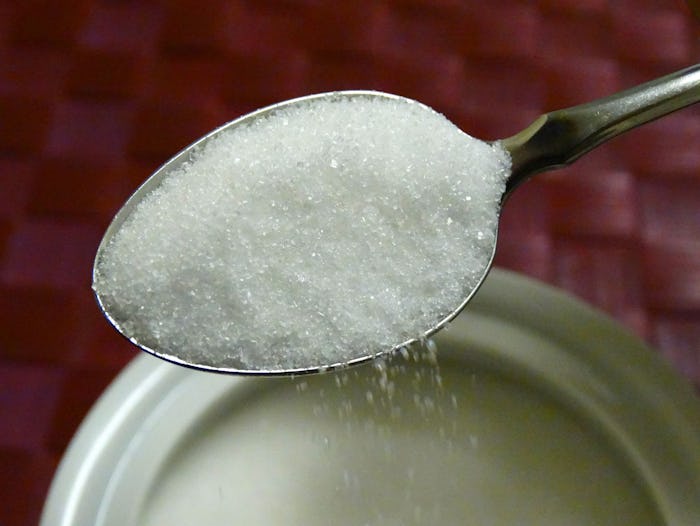If you've committed to living healthier this year, one thing you've probably changed is your diet. Sweets are one of the first things people cut out of their meal plan, but not all sugar comes from dessert. You might not realize it, but your body will send you signs if you're eating too much sugar.
According to Family Doctor, the main sources of added sugars in the U.S. are sugary drinks (soft drinks, sports drinks, energy drinks, and juice drinks), candies and desserts such as cakes, cookies, pies, pastries, and doughnuts, and dairy desserts like ice cream and sweetened yogurt. However, Everyday Health warned that you don't have to have a sweet tooth to have a diet high in sugar. The website noted that processed savory foods such as tomato sauces, canned soups, salad dressings, breads, and granola bars can also contain a ton of added sugars. Additionally, the sweet stuff is often is used to cut acidity in some sauces, and to make up for lost flavor in many fat-free foods.
One of the ways a person can tell if their diet is not as healthy as is should be is when they've started to make lifestyle changes, but they don't look or feel any different. Here are some weird signs you may be eating too much sugar.
1You Feel Depressed
ccording to an article in Psychology Today written by Dr. David Sack, who is board certified in psychiatry, addiction psychiatry, and addiction medicine, people with depression tend to have low levels of brain-derived neurotrophic factor, a protein produced that promotes neuron growth. And sugar is known to suppress BDNF.
Prevention noted that eating too much sugar can also raise levels of inflammation throughout the body and brain. And, as confirmed by a study in JAMA Psychiatry, neuroinflammation is higher in individuals who suffer from depression.
2You Have Low Energy Levels
If you're always feeling worn out, it may be because your diet is high in sugar. Amanda Bontempo, a registered dietitian at NYU Langone's Laura and Isaac Perlmutter Cancer Center, told Reader's Digest that sugary food gives you a surge of dopamine. Because glucose digests rapidly, your dopamine and blood sugar levels will also fall quickly sending you into a lethargic low. This could leave you with a headache and the urge to take a nap.
The same thing can happen if you load up on sugar right before exercising. Sara Folta, an assistant professor at Tufts Friedman School of Nutrition Science and Policy told Reader's Digest that simple sugars cause a spike in blood sugar followed by a rapid drop, which can lead to a crash in the middle of your workout.
3You Always Feel Hungry
According to Folta, foods that are high in sugar, but low in protein and fiber do not trigger the mechanisms that make your body feel like it just ate. You tend to stay hungry and are more likely to overeat, choose more sugary foods, and gain weight.
4You Have Acne
A study published in the Journal of the Academy of Nutrition and Dietetics found that people with moderate to severe acne reported eating up to four times more sugar than people with no or mild acne.
5You Have High Blood Pressure
Salt intake is usually believed to contribute to high blood pressure, but a study published in the journal Open Heart found that diets high in added sugar contribute substantially to cardiometabolic disease (this does not apply to naturally occurring sugars, such as fruits). According to the study, added sugars matter even more than dietary sodium for hypertension.
6You Always Crave Sugary Foods
According to Brooke Alpert, registered dietitian and author of The Sugar Detox: Lose Weight, Feel Great and Look Years Younger, the more sugar you eat, the more you will crave it. The sugar high followed by a crash will have you craving the high again.
The Sugar Detox: Lose Weight, Feel Great and Look Years Younger, $24, Amazon
7Your Brain Is Foggy
The rapid rise and fall of blood sugar caused by high sugar intake can leave your brain feeling foggy. According to Alpert, uncontrolled blood sugar puts you at risk for cognitive issues and impairment.
